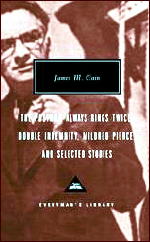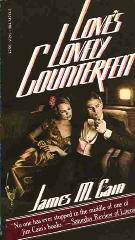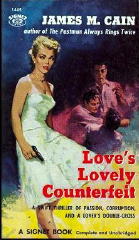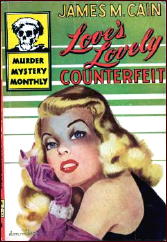Tue 28 Apr 2009
Archived Review: JAMES M. CAIN – Love’s Lovely Counterfeit.
Posted by Steve under Reviews[3] Comments
JAMES M. CAIN – Love’s Lovely Counterfeit.
Vintage, paperback reprint; 1st pr., 1979. First edition: Alfred A. Knopf, 1942. Other paperback reprints include: Avon Murder Monthly 44, 1947; Signet 1445, 1957.

The brief biography of Cain at the end of the book I read, published in 1979, describes him as being “recognized today as one of the masters of the hard-boiled school of American novels.” It’s almost 25 years later, and wondering if that were still true, I decided to see how many of his books are still in print.
Thanks to the folks at Black Lizard, among others, I can report that you can buy any or all of the following novels in new, currently available editions: Mildred Pierce, The Postman Always Rings Twice, Double Indemnity, and The Magician’s Wife. And that’s it. Next month [April 2003] Everyman’s Library is coming out with a omnibus edition (matching their Raymond Chandler books) containing the same first three of the four novels above, plus five short stories.
It’s a must have, but there should be more. The rest of his work seems to have disappeared, including the one at hand. Cain’s reputation seems to have boiled down to only the three novels, plus word of mouth among collectors of vintage paper.
[INSERT] 04-28-09. I’ve just checked online, and unless I’ve missed something, nothing has changed since I first wrote this review.

So it’s like this: If you’re a fan of tough guy novels and you ever find a used copy of Love’s Lovely Counterfeit, grab it up.
It’s the story of Ben Grace, a small-time chiseler in the rackets — not crooked, not straight, just in between — who, full of grievances, makes the most of his inside information as Sol Caspar’s chauffeur to aid and abet the opposing party’s upcoming mayoral election campaign. His ally (and soon-to-be lover) in the enemy camp is a very good-looking girl named June Lyons, who is also very dedicated to justice.
It sounds predictable, but it Cain’s hands, it’s anything but. It may seem strange to say, but works of fiction are usually less complicated than the real world, as who would believe the twists and turns that real life can have? But when you think the story’s going one way, Cain heads it off in another. Or, perhaps, he lets it go off in another, on its own, as if he set the characters up, and then he let them find their own destiny, their own fate. Which, of course, they do.
As a footnote, Cain often has a unique touch in the way he describes people. From page 87:

Or, this description of June Lyons, as she appears later in the book (page 111):

I didn’t write either of these two passages. All I did was type them. It only makes me wish I could write.
April 28th, 2009 at 8:56 pm
The triumvirate used to be Hammett, Chandler, and Cain. Then it became Hammett, Chandler, and Ross Macdonald, and now it is most often Hammett, Chandler, and Spillane. Despite the films Cain is hurt a bit by several things. One he has no series character, and two, he’s uneven. Always interesting, but uneven. Finally the doom laden nature of so many of his books makes them heavy going compared to Hammett’s tough cynics and Chandler’s battered knight.
He was a more novelistic writer than Chandler or Hammett, more apt to experiment with other forms — western, historical novel, soap opera — and his characters, while fascinating, tend to be on the sleazy side. Like Hammett and Chandler he inspired his own school of writing, with writers like David Goodis and Jim Thompson following his lead (though in Goodis’s case Cornell Woolrich is also an influence). Books like Mildred Pierce, Serenade (his masterpiece), Past All Dishonor, and Mignon may throw readers expecting typical hardboiled novels of crime and punishment.
And a warning, if you have never read Double Indemnity it is notably different from the film in many ways. It’s also very short, virtually a novella instead of a novel, and while well written and at heart the same story as the film you may find yourself missing the voice of Billy Wilder and Raymond Chandler that made so much of this slight book. While I like Cain’s own ending in the light of the book, I’ll admit it is melodramatic and a bit arty. Cain overused the shark metaphor and here it is a bit heavyhanded.
Love’s Lovely Counterfeit was made into a pretty good film, Slightly Scarlet (1956) directed by Alan Dwan. John Payne, Arlene Dahl, Rhonda Fleming, Kent Taylor, and Ted de Corsia starred. It’s a pretty good late study in big city corruption with Arlene very good as a hard drinking ex con. Payne is a good lead in it. Not a great film, but a very good one.
April 28th, 2009 at 11:17 pm
It’s a funny thing, but when I saw Slightly Scarlet many years ago, I had no idea that it was based on a novel by James M. Cain, and when I read Love’s Lovely Counterfeit, I don’t think I aware one iota that there was a film based on it.
Now that the Internet’s here, connections like this are as easy to make as falling off a bicycle — and if you don’t, then somebody will come along and remind you.
Thanks, David!
— Steve
PS. Your analysis of Cain’s career seems right on to me.
April 29th, 2009 at 1:25 am
Thanks Steve.
I’m not surprised you didn’t know Love’s Lovely Counterfeit was the basis of Slightly Scarlet, although Maltin mentions it, it’s not made much of even though it is a good film adaptation of the book and faithful to it(certainly better than the awful Anthony Mann musical of Serenade with Mario Lanza, and Joan Fontaine in the role of the books homosexual impresario). Counterfeit was also adapted on radio, and not bad as I recall, though it has been years since I heard it. For some reason the book isn’t included as major Cain, even though I think it is just below Postman, Mildred Pierce, and Serenade in importance and quality.
Cain’s biographer Roy Hoopes wrote a pretty good novel about the Tea Pot Dome scandal, Our Man in Washington, featuring Cain and H.L. Mencken as the sleuths, a comic take on corruption during the Harding administration.
While the Cain books aren’t in print they aren’t exactly rare either, and most of them can be found fairly easily. The western Past All Dishonor and Civil War novel Mignon are both good, though the later books are a mixed lot. Cain is seldom dull, but many of his books are only borderline crime or suspense, and he’s best taken in small doses unless you really enjoy depression and sleaze.
As a screenwriter he worked on Algiers (remake of Pepe Le Moko “Come wiz me to ze Casbah”)and the Spanish Civil War adventure Blockade, and though it isn’t mentioned at IMDB he contributed to the screenplay for John Farrow’s classic B film, Five Came Back.
Another surprising Cain film is Wife Husband and Friend (1939) remade as Everybody Does It (1949) based on his Two Can Sing (an earlier version was Career in C Major), a comic tale of a wife who wants a career as an opera diva only to discover her oaf of a husband has a talent that far surpasses hers. The 1949 version with Paul Douglas and Celeste Holm in the roles played in the good 1939 version with Warner Baxter and Loretta Young is a superior comedy.
There’s a good article by William Marling at http://www.detnovel.com/Cain%20James.html
Cain never embraced either the mystery genre or the hardboiled mantle, and though he returned to it over the years and helped define the voice and the nature of both film noir and the French serie noir school he was never comfortable with the idea of being a genre writer and didn’t come out of the pulps like Hammett and Chandler. Still, every decade or so his work is reassessed and rediscovered by someone, and it’s about time for another revival. In that he is somewhat like Cornell Woolrich who fades in and out of semi obscurity.
Hammett and Chandler seem to be the only writers with a permanent place among the hardboiled immortals and you have to wonder who will replace Spillane as he replaced Ross Macdonald and Macdonald replaced Cain, though it’s just possible Spillane is individual and unique enough to hold his place as the third man on the mountain, since he has both an iconic series character and is in no way an imitation of the others (I know that will inflame many Macdonald fans, and while I love Macdonald and Archer, their relative decline is largely due to the fact his work will always be in Chandler’s shadow — fairly or not — and let’s face it, Archer has the personality of a paper hat save when Paul Newman plays him on screen).